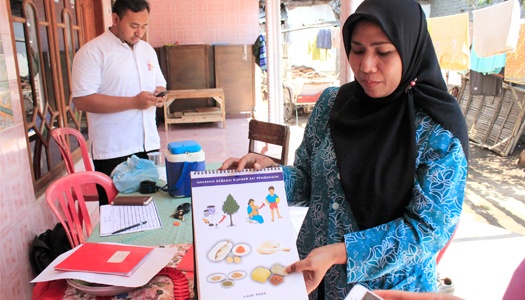An Interview With Popon Anarita and Andrew Thornley of The Asia Foundation.
The Innovating in Civic Engagement Program, implemented by The Asia Foundation, promotes open and accountable government in Indonesia and is supported by the Government of Australia. The program recently teamed up with Elva, a platform which combines SMS, smartphone and web reports to track the impact of development programmes in real-time.
Pulse Lab Jakarta promotes data innovation for development and humanitarian action in Asia-Pacific, so we were keen to hear from Popon and Andrew about their experience with Elva.
You recently teamed up with Elva to gain community feedback on health services in Aceh and Jakarta. What first attracted you to its approach?
In a word, simplicity. They are only interested in looking at the data that is absolutely necessary to understand the issue and in presenting this in the simplest way possible.
Like us, they hear from partners first and prioritise local ownership and experience. They also admit where their approach hasn’t worked in the past, such as engaging parliaments. We really appreciated their openness.
With our partner, Solidaritas Perempuan (Women’s Solidarity), we had a plan to aggregate data from communities and present it in a way that is accessible to all, but we didn’t know how to do it. When we first connected with Elva at one of Pulse Lab Jakarta’s networking events, Jonne presented examples of their work in other countries and it was clear that we should collaborate.
You mention making the data accessible to all, what do you mean by that?
Much of the data for development is stuck in an ‘extractive paradigm’. By that I mean that data is generated by communities then extracted to inform central decision-making.
For us, this just doesn’t add up. First of all because communities should as a principle have access to their data, but secondly because the knowledge that is needed to understand the data and to develop meaningful insights is at the local level.
For example, data from the recent survey on citizen satisfaction with public health services allowed Solidaritas Perempuan to show that, in general, respondents in Jakarta and Aceh most want to see improvements in health facilities and in the quantity and quality of local health officials. No surprises here. But with the data visualization platform, their local surveyors were able to reveal a significant and surprising range of suggested improvements. By highlighting issues specific to each of the 23 health centers surveyed, they are able to support more tailored analysis and recommendations.
So when I say access, I mean access to data interfaces that make sense to all of our stakeholders. Elva gets this. The partnership isn’t about pushing a particular technology. They are just as happy to use pens and paper.
What can development sector players learn from your collaboration with Elva?
The approach is an M&E dream! Data on citizens’ experiences of public services and development programmes is undeniable. Donors no longer have to wait for our reports; they have instant data to evaluate. We are very excited by this prospect.
Specific to the collaboration with Elva, we often work with NGOs that are very savvy on community-level issues, but that struggle to make the data and insights available, accessible and digestible across their networks.
The initiative with Elva is a clear proof of concept for us. The data is accessible across Solidaritas Perempuan’s network. But the focus now is on developing meaningful engagement around the data. Our hope going forward is that this will facilitate a different kind of conversation with stakeholders at all levels: from trying to persuade public servants that an issue exists to discussions on what to do about it. Data-driven advocacy is much harder to ignore.
The data is also strengthening Solidaritas Perempuan’s internal organisation, communication, and understanding of what different parts of its vast network think. Potential exists to work with coherence at all levels, from community planning all the way up to advocacy with national legislators. This was not the case in the past.
With so much potential, where will you go from here?
With over 3,700 community reports in six weeks, the health sector initiative demonstrated to us that this is a cost effective way of developing both local organisations and broader platforms for policy advocacy.
The next step for The Asia Foundation, Solidaritas Perempuan and Elva is to focus the approach on community issues in three regions, with the intention of breathing more substance into debates about public services as well as the upcoming rounds of local elections.
Pulse Lab Jakarta is grateful for the generous support from the Department of Foreign Affairs and Trade of the Government of Australia.
Top image: A Posyandu (Integrated Health Clinic), the very frontline of health services [Lody Andrian/UN Global Pulse, 2015]

